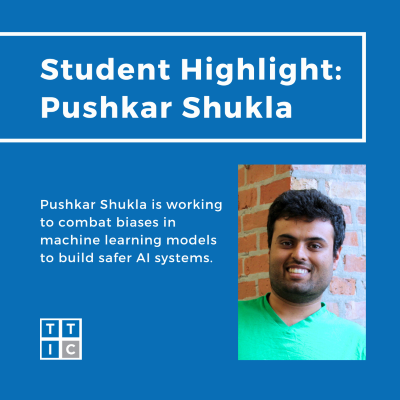
Student Highlight: Pushkar Shukla
Pushkar Shukla is a Ph.D. student and candidate at TTIC, where he has been studying since September 2019 under the guidance of his advisor, Matthew Turk. He completed his master’s in Computer Science at the University of California, Santa Barbara, after earning his B.Tech in Electronics and Telecommunications at Uttarakhand Technical University in India.
Pushkar was drawn to TTIC by its unique, collaborative environment. When he first arrived, he was struck by how approachable and deeply involved the professors were in research. The ease of collaboration and the research-heavy focus of the institution made it the perfect place for him to pursue his Ph.D.
“The research environment here is so collaborative, and people are so open to discussing their research with each other, and extremely humble,” Pushkar said.
His research revolves around the important issue of understanding and mitigating bias in AI (artificial intelligence), with a focus on computer vision. Pushkar is particularly interested in understanding the nature of biases in generative AI models like Diffusion Models and exploring the intersections of different bias dimensions such as race, age, gender, socio-economic status, and culture. He aims to ensure that AI systems are not only effective but also fair across different demographics and can be used safely and responsibly.
“AI systems have already made a positive impact on society, but much more needs to be done to ensure they are safe, harmless, and used for the benefit of humanity,” Pushkar said. “Due to how AI systems gather information, a large part of which is either from the internet or from other sources that represent a certain section of the society, it does not perform equally well for different people and different demographics. I am working to build systems that not only help us understand the potential harms caused by AI but also mitigate and prevent these risks.”
Pushkar’s inspiration for this work came while working as an undergrad on a project that focused on developing an algorithm to recognize developmental disorders in facial images. He noticed that the proposed model had strong biases towards individuals of Asian descent, particularly in cases related to Down syndrome.This observation motivated him to explore the subject of bias in AI more deeply.
“Building safer AI systems is something I’m passionate about,” Pushkar shares, as he continues to explore ways to reduce harm and make AI more equitable. “By training AI systems to know what is harmful and be able to measure how harmful it is, some of the bias can be mitigated.”
One of Pushkar’s favorite experiences at TTIC has been organizing outings and exploring Chicago with his fellow students. He fondly recalls a paintball trip during his first year, a memory that still stands out for him. Beyond the activities, it’s the intellectual discussions and deep conversations with his peers that he appreciates the most.
“Sometimes I would host dinners at my apartment and have deep conversations with other students and researchers at TTIC,” Pushkar said. “I really enjoyed the community aspect of it.”
Looking ahead, Pushkar is still deciding between academia and industry but knows that he wants to continue working on AI and bias mitigation. When offering advice to future TTIC students, he encourages them not to stress too much about what’s to come.
“I’ve been the most productive and happiest when I wasn’t overly worried about what was next,” Pushkar said. “Focus on creating a research ecosystem where you can have meaningful discussions with peers—that can lead to more productivity and growth.”
Pushkar’s journey at TTIC reflects his passion for making AI safer and more inclusive, while his experiences have been shaped not only by his research but also by the connections and memories made along the way.

